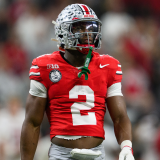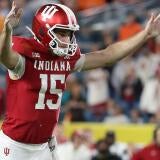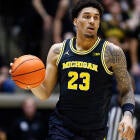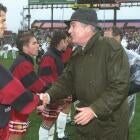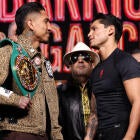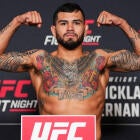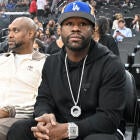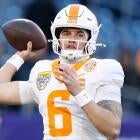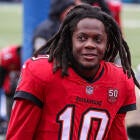Every team's most desired NFL Draft do-over: Bears passing on Patrick Mahomes among all-time whiffs
If given the chance, every NFL team would change these draft gaffes

Tony Dorsett is the definition of a slam-dunk draft pick. After winning a Super Bowl in 1971 (and coming just short in 1975), the Cowboys were a featured running back away from being a title team again. Dallas selected Dorsett on May 3, 1977. Eight months later, the University of Pittsburgh's all-time leading rusher scored a touchdown in the Cowboys' Super Bowl XII victory.
To the chagrin of NFL teams and fans, that scenario is not the rule but the exception. Far too often then they'd like to admit, teams have whiffed on picks that would have netted them a substantial gain. Some teams managed to recover from their draft faux pas, while other teams are still kicking themselves for their mistakes.
With the 2024 NFL Draft nearing kickoff, we decided to take a look at each NFL team's most desired do-over. Needless to say, teams will try to avoid making similar mistakes during this year's draft.
Arizona Cardinals
2006 NFL Draft, 10th overall pick: QB Matt Leinart
In the short term, this pick didn't really hurt the Cardinals. They made the Super Bowl in 2008, after all. But the pick definitely hurt Arizona in the long run. The Cardinals could have selected Jay Cutler, who was taken one pick after Leinart. Cutler, who went on to enjoy success in Denver and Chicago, could have been Kurt Warner's successor or even challenged Warner as the team's starting quarterback. Arizona, which finished 32nd in rushing during its Super Bowl season, could have also used the pick to select a running back. The '06 draft had several talented running backs selected after Leinart that included Laurence Maroney, DeAngelo Williams and Joseph Addai.
Atlanta Falcons
1991 NFL Draft, No. 3 overall pick: DB Bruce Pickens
Atlanta was looking for a defensive back who could complement Deion Sanders. If the Falcons had a do-over, they surely would have instead drafted Todd Light, who was selected two spots after Pickens. Pickens lasted less than three seasons in Atlanta, while Light enjoyed a successful 12-year career that included a Super Bowl win with the Rams in 1999.
Buffalo Bills
2004 NFL Draft, 22nd overall pick: QB J.P. Losman
After missing out on Eli Manning, Ben Roethlisberger and Philip Rivers, Buffalo (after selecting receiver Lee Evans with the 13th pick), traded its second- and fourth-round picks, as well as the next year's first-round pick, to select Losman. It goes without saying that the Bills would have been better served saving those picks. Had the Bills not traded their 2005 first-round pick, they would have had the 20th overall pick, which would have put them in position to select Aaron Rodgers.
Baltimore Ravens
2003 NFL Draft, 19th overall pick: QB Kyle Boller
After selecting Terrell Suggs with the 10th overall pick, Baltimore traded its 2004 first-round pick to New England to select Boller. The Patriots used the Ravens' draft pick to select Vince Wilfork. Boller won less than half of his starts in Baltimore, while Wilfork was a five-time Pro Bowler and a starter on two Patriots championship teams.
Carolina Panthers
2008 NFL Draft, 19th overall pick: OT Jeff Otah
It's safe to say that the Panthers would select a different offensive tackle if they could jump into Doc Brown's DeLorean. Instead of taking Otah (who appeared in just 27 games over three seasons), Carolina would surely spend the pick on Duane Brown, who was taken by Houston with the 26th pick. Brown, who is currently preparing for his 16th season, is a five-time Pro Bowler who has started in each of his 203 career regular-season games.
Cincinnati Bengals
1999 NFL Draft, No. 3 overall pick: QB Akili Smith
Cincinnati would have been better served using this pick to select quarterback Daunte Culpepper, who was ultimately taken by the Vikings with the 11th pick. Culpepper, who went on to enjoy considerable success in Minnesota, would have been set up to have success with the Bengals. He would have likely spent his rookie season learning from veteran Jeff Blake. Whenever the offense was given to him, Culpepper would have had the luxury of playing with Pro Bowl running back Corey Dillon and receivers Chad Johnson (selected in the second round of the 2001 draft) and T.J. Houshmandzadeh (selected in the seventh round of the 2001 draft).
Cleveland Browns
2004 NFL Draft, No. 6 overall pick: TE Kellen Winslow
This choice isn't as much about the player the Browns drafted as it is about the player the Browns did not draft. Cleveland missed out on a golden opportunity to select Ben Roethlisberger, an Ohio native who was ultimately taken by the rival Steelers with the 11th pick. While he wasn't drafted by the Browns, Roethlisberger still held the record for the most wins by a starting quarterback at FirstEnergy Stadium until Baker Mayfield finally broke Big Ben's mark in 2020.
Chicago Bears
2017 NFL Draft, No. 2 overall pick: QB Mitchell Trubisky
Eight picks after the Bears selected Trubisky (who lasted four seasons in Chicago and is now a backup in Buffalo), the Chiefs drafted Patrick Mahomes, who has since won two league and three Super Bowl MVP awards. It's safe to say that, if given the chance at a do-over, the Bears would have instead drafted Mahomes.
Chicago's decision back then is still impacting the franchise now. The Bears, who recently gave up on 2022 first-round pick Justin Fields, are expected to draft Caleb Williams with the hope he can be the their long-awaited franchise quarterback.
Dallas Cowboys
1998 NFL Draft, No. 8 overall pick: DE Greg Ellis
Ellis ended up being a solid player, with 77 sacks in 11 seasons with the Cowboys. But Dallas, despite allegedly making pre-draft promises to him, passed up on the chance to draft generational talent Randy Moss. Moss, who fell to the Vikings with the 21st overall pick, got his revenge on the Cowboys on Thanksgiving Day that season. In what was a standout game during a record-breaking rookie season, Moss caught three passes for 163 yards and three touchdowns against the team he thought was going to select him.
For more draft coverage, you can hear in-depth analysis twice a week on "With the First Pick" -- our year-round NFL Draft podcast with NFL Draft analyst Ryan Wilson and former Vikings general manager Rick Spielman. You can find "With the First Pick" wherever you get your podcasts: Apple Podcasts, Spotify, YouTube, etc.
Denver Broncos
2016 NFL Draft, 26th overall pick: QB Paxton Lynch
Instead of taking Lynch, the defending Super Bowl champions should have taken Derrick Henry, who fell to the Titans with the 45th pick. Henry would have been a significant upgrade over fourth-round pick Devontae Booker, who averaged just 3.5 yards per carry during the 2016 season.
Detroit Lions
2003 NFL Draft, No. 2 overall pick: WR Charles Rogers
It's hard to blame the Lions for selecting Rogers, a local product who put up prolific numbers at Michigan State. But with the benefit of hindsight, it's safe to say that the Lions would have instead selected Andre Johnson, who was taken by the Texans with the No. 3 overall pick. Rogers caught just 36 passes in three seasons in Detroit, while Johnson developed into one of the best receivers of his era.
Green Bay Packers
1998 NFL Draft, 19th overall pick: DL Vonnie Holliday
While Holliday wasn't a bad pick, the Packers surely regret not selecting Moss, who ended up torching them in Minnesota over the next seven years. Furthermore, Moss would have been the perfect complement for fellow receiver Antonio Freeman, who had nearly 1,000 more receiving yards than Green Bay's second leading receiver in 1998. The Packers' lack of an explosive receiver played a role in the team's backslide at the end of the '90s.
Houston Texans
2002 NFL Draft, No. 1 overall pick: QB David Carr
While Carr was a solid pro, he was not set up for success in Houston, where he was sacked a league-high 76 times in 2002, 49 times in 2004 and 68 times in 2005. Houston would have been better served selecting Julius Peppers, the No. 2 overall pick who enjoyed a career that will likely be immortalized in the Hall of Fame sometime soon.
Indianapolis Colts
1992 NFL Draft, No. 1 overall pick: DE Steve Emtman; No. 2 overall pick: LB Quentin Coryatt
Sans Marshall Faulk, the Colts had a series of first-round mistakes during the early '90s. Their biggest whiffs were in the '92 draft, when they drafted two defensive players who would play in less than 100 games during their time in Indianapolis. While Coryatt was a capable starter, Emtman lasted just three seasons and 18 total games in Indianapolis. If given the chance to redo the '92 draft, the Colts would likely use those picks to select cornerback Troy Vincent (who was selected 21 spots ahead of the Colts' second-round pick, cornerback Ashley Ambrose) and Robert Porcher, who retired with 95.5 career sacks.
Kansas City Chiefs
1983 NFL Draft, No. 7 overall pick: QB Todd Blackledge
While John Elway was the first player selected, the Chiefs still had their choice of two other future Hall of Fame quarterbacks -- Jim Kelly and Dan Marino -- with the seventh overall pick. It's safe to say that Kansas City would have selected either quarterback if given the chance at a do-over. The Chiefs enjoyed moderate success with Steve DeBerg and Dave Krieg until someone named Joe Montana led them to an AFC Championship Game appearance in 1993.
Los Angeles Chargers
1998 NFL Draft, No. 2 overall pick: QB Ryan Leaf
Not too much of a surprise here. The main question is, who would the Chargers have taken instead of Leaf? When looking at the rest of their '98 draft, the Chargers would have likely selected Charles Woodson had they not taken Leaf with the No. 2 pick. Woodson would have been a significant addition to a Chargers defense that at the time already included Junior Seau and Rodney Harrison. The Chargers could then have taken Charlie Batch with their second-round pick, or Matt Hasselbeck with a late-round pick.
Los Angeles Rams
1996 NFL Draft, No. 6 overall pick: RB Lawrence Phillips
The first round of the '96 draft featured two of the biggest all-time running back busts in Phillips and Tim Biakabutuka. It also included 1995 Heisman Trophy winner Eddie George, who was selected after both of the aforementioned running backs with the 14th pick. Ironically, it was George who nearly led the Titans to an upset of the Rams in Super Bowl XXXIV. And while the Rams ultimately found their featured running back in the form of Faulk, it's safe to say that they would have selected George had they had the chance to redo this draft pick.
Jacksonville Jaguars
2011 NFL Draft, No. 10 overall pick: QB Blaine Gabbert
Jacksonville could have some fun redoing the 2011 draft. The Jaguars could have traded back a few spots and still would have been able to select Mike Pouncey instead of Will Rackley, the guard they did draft with the 76th overall pick. The Jaguars could have also traded out of the first round entirely in exchange for two second-round picks. With those picks, Jacksonville would have been in position to draft either Andy Dalton or Colin Kaepernick.
Miami Dolphins
1998 NFL Draft, 29th overall pick: RB John Avery
Instead of getting Marino a much-needed receiver, the Dolphins traded back 10 spots in the first round to take a running back who lasted a mere 17 games in Miami. If Jimmy Johnson had a chance to do this one over, he surely would have taken Moss, who could have possibly given Marino one last legitimate shot at a title. To fix their hole at running back, the Dolphins could have waited until the third round to select Ahman Green, who earned four consecutive Pro Bowl berths during his time with the Packers.
Minnesota Vikings
2005 NFL Draft, No. 7 overall pick: WR Troy Williamson
Instead of trying to replace Moss with Williamson (who caught 87 passes during his NFL career), the Vikings could have instead gone with Roddy White, the sixth and final receiver taken in the first round of the 2005 draft. Another Vikings draft do-over that received consideration was the 2011 selection of Christian Ponder with the 12th overall pick. Instead of Ponder, the Vikings could have had both Kaepernick and Adrian Peterson in their primes.
New England Patriots
2019 NFL Draft, 32nd overall pick: WR N'Keal Harry
The Patriots' lack of receiving threats during the second half of the 2019 season largely contributed to Brady's unceremonious ending in New England. The Patriots had several other options still available at receiver at this point in the draft. Among those receivers include Deebo Samuel (selected by the 49ers with the 36th pick), A.J. Brown (selected by the Titans with the 51st pick), and D.K. Metcalf (taken by the Seahawks with the 64th pick).
New Orleans Saints
1999 NFL Draft, No. 5 overall pick: RB Ricky Williams
Mike Ditka and the Saints traded eight draft picks -- including two first-round picks -- in order to select the 1998 Heisman Trophy winner. Williams ended up having a very solid career, but he and the Saints' initial struggles ultimately led to Ditka's firing at the end of the '99 season. A year later, Williams and the Saints won the first playoff game in franchise history before stumbling back into mediocrity until Sean Payton and Brees' arrival.
Given the chance at a do-over, the Saints probably would have stayed with the No. 12 overall pick, which they could have used to select pass rusher Jevon Kearse. They could have used the No. 2 pick in the 2000 draft on running back Jamal Lewis, a future 2,000-yard rusher who helped Baltimore win the Super Bowl that season.
New York Giants
2021 NFL Draft, 20th overall pick: WR Kadarius Toney
Disappointing doesn't begin to sum up Toney's short time in New York. He caught just 41 passes in 12 games before the Giants traded him to Kansas City. When looking back at the '21 draft, the Giants would have been better off selecting Nico Collins (who was ultimately taken by Houston in the third round) or trying to trade up to select any of DeVonta Smith, Jaylen Waddle or Ja'Marr Chase.
New York Jets
2008 NFL Draft, No. 6 overall pick: DE Vernon Gholston
Given the chance at a do-over, the Jets would trade back into the second half of the first round, where they would select either Joe Flacco (taken by the Ravens with the 18th overall pick) or Aqib Talib (taken by the Buccaneers with the 20th pick). Flacco would have been an upgrade over Mark Sanchez (the fifth overall pick in the 2009 draft), while Talib would have been a force alongside perennial All-Pro cornerback Darrelle Revis.
Las Vegas Raiders
2007 NFL Draft, No. 1 overall: QB JaMarcus Russell
Adding insult to injury here is the fact that the Raiders missed out on acquiring several future stars with the No. 1 overall pick. Among them are Hall of Fame receiver Calvin Johnson (the No. 2 overall pick), tackle Joe Thomas (the No. 3 overall pick), running backs Peterson (the No. 7 overall pick) and Marshawn Lynch (the 12th overall pick) and linebacker Patrick Willis (the 11th overall pick). Instead, the Raiders chose Russell, who compiled a 7-18 record as their starting quarterback.
Philadelphia Eagles
2001 NFL Draft, No. 25 overall: WR Freddie Mitchell
Outside of his memorable "fourth-and-26" catch in the 2003 playoffs, Mitchell's run in Philadelphia was largely forgettable. The Eagles would surely like to go back and spend that pick on either Reggie Wayne (selected with the 30th pick) or Chad Johnson (the 36th overall pick). Wayne and Johnson could have made the difference for an Eagles team that fell short in three consecutive NFC title games as well as in Super Bowl XXXIX.
San Francisco 49ers
2000 NFL Draft, No. 65 overall: QB Giovanni Carmazzi
The 49ers drafted not one but two quarterbacks in the 2000 draft. Along with Carmazzi (who never played in an NFL regular-season game), the 49ers spent a seventh-round pick on Tim Rattay, who won just a third of his 12 starts in San Francisco. The 49ers did not, however, select Brady, the seventh quarterback and 199th player selected. A California native who grew up idolizing Joe Montana, Brady likely would have added to the 49ers' Super Bowl collection while following in Joe Cool's footsteps.
Seattle Seahawks
1991 NFL Draft, No. 16 overall: QB Dan McGwire
Seahawks coach Chuck Knox wanted to select Brett Favre. Seattle ownership wanted to select McGwire. Unfortunately for Knox and Seahawks fans, ownership prevailed, as Favre was eventually taken by the Falcons with the 33rd overall pick. McGwire was out of football by the 1996 season, the year Favre won a Super Bowl along with his second of three consecutive MVP awards in Green Bay.
Pittsburgh Steelers
1983 NFL Draft, No. 21 overall: NT Gabe Rivera
The league's best drafting team during the previous decade, Chuck Noll had visions of Joe Greene when he selected Rivera. Unfortunately for Noll, a car accident ended Rivera's career after just six games. Making matters worse was the fact that the Steelers passed on selecting Marino, a Pittsburgh native who wanted to play for his hometown team. Instead of leading the Steelers to the Super Bowl, Marino stood in their way in the 1984 AFC Championship Game. Marino threw for 421 yards and four touchdowns in Miami's 45-28 win. The Steelers didn't make the same mistake in 2004, when they took Roethlisberger with the 11th overall pick.
Tampa Bay Buccaneers
1986 NFL Draft, No. 1 overall: RB Bo Jackson
Jackson's beef with Buccaneers owner Hugh Culverhouse led to the 1985 Heisman Trophy winner never playing a down with Tampa Bay. Jackson was later drafted by the Raiders, where he became the first professional player to earn all-star honors in two different sports. The Buccaneers would have been better served selecting pass rusher Leslie O'Neal, who would have likely helped bolster a Tampa Bay defense that tallied just 19 sacks during the 1986 season.
Tennessee Titans
2011 NFL Draft, No. 8 overall: QB Jake Locker
Despite Locker's shortcomings, the Titans -- with Matt Hasselbeck under center -- managed to go 9-7 in 2011. It's safe to say that the presence of J.J. Watt (the 11th overall pick in the draft) could have done enough to nudge the Titans into the playoffs that season. The Titans could have also selected Dalton or Kaepernick as their next quarterback.
Washington Commanders
1991 NFL Draft, No. 4 overall: WR Desmond Howard
The defending champions were hoping to add some youth to its receiving corps with the selection of Howard, the reigning Heisman Trophy winner. Howard later won MVP honors in Green Bay's Super Bowl XXXI win over New England, and was a Pro Bowler in Detroit in 2000. But Howard's time in Washington was largely forgettable. If given a do-over, it's safe to say Washington would have used that pick on another position while using their second-round pick to select either Carl Pickens or Jimmy Smith, who enjoyed successful runs with Cincinnati and Jacksonville, respectively.




